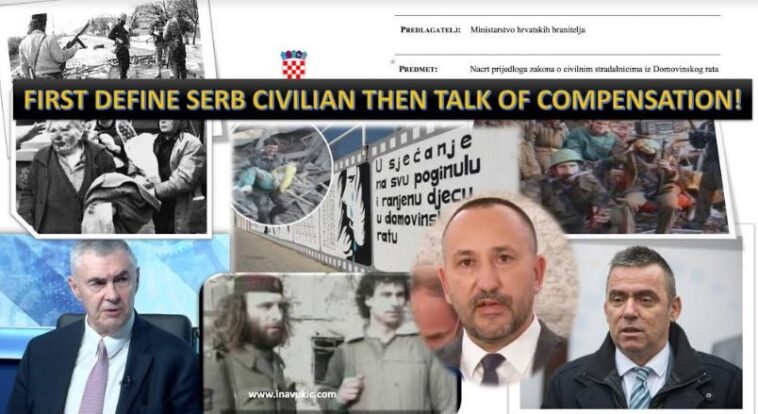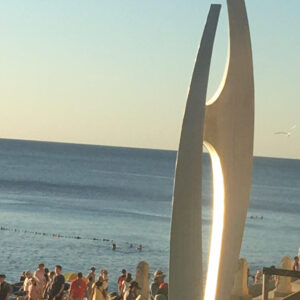In any war civilian victims are defined as casualties of war killed or injured by non-civilians. Civilians who are helping a war effort are people working to supply the troops or paramilitary forces and to provide them with weapons, shelter, cheer them on or help in other ways are not combatants in the sense of bearing arms, but they are an essential part of the war machine and constitute a threat to the other side and, therefore,may well (must) be considered as combatants and not civilians.
Even thirty years after Serb (Croatian rebel Serbs and Serbs from Serbia) and Yugoslav Army aggression against Croatia began, Croatia has not managed to sort this out. And it was the first thing it should have done after the Homeland War had completely ended with the re-integration of its last occupied territory of Eastern Slavonia in 1998. For all the public knows Croatia has no list of Serb “civilians” in Croatia who must be listed as non-civilians and yet Croatian government has the terrible and mean audacity to try and pass its new legislation regarding the rights of civilian victims during its Homeland War including among them Croatian Serb rebels and their families and friends who were actively involved, in one way or another, in the aggression against Croatia.
Clearly distinguishing between civilians and non-civilians (civilian combatants) has never been more important for Croatia than now. This importance arises from the fact that if this is not clearly defined it will serve as yet another notch in the repulsive denial of human rights of the real victims that equating the victim with the aggressor has been doing so far in Croatia.
During this past week the matter of proposed new legislation for civilian victims of Croatian Homeland War has been before the Croatian Parliament and the floor clearly demonstrated that even though Croatia won that bloody war of aggression against it, the war is by a long shot not over. Croatian Serbs who belonged to the rebel squads during the war, who simply cannot be considered as civilians, still have their sights on taking over Croatia for Serbia and they are in parliament as representatives who got into the parliament with a couple of hundred votes – because Croatia’s law regarding minority rights permits that. They do not represent those Croatian Serbs who are in the same minority but fought on the Croatian side in war, to defend Croatia from Serb aggression. They are in parliament with the task of equating Croatian victim with Serb aggressor.
Croatian authorities appear to have purposefully forgotten or are sweeping under the carpet the fact that Serb aggression against Croatia started with the Croatian Serb rebels, many of whom come under the definition of civilian combatants who actually drove the aggression and who caused untold damage and loss to Croatians even though they belonged at the time to no official army. Their family members and friends helped them to cause untold damage to Croatia and continued to do so. They were all an army of “civilians”, intent on ethnically cleansing Croats from their own homes so that their homes become a part of Greater Serbia. This is simple language but nevertheless most relevant. The so-called Log Revolution (Blavanska revolucija) was an insurrection by Croatian citizens of Serb extraction who in August of 1990 barricaded sections of Croatian territory near Knin in efforts to stop Croatia in its path of secession from communist Yugoslavia. These rebel Serbs were armed and dangerous and their families stood tight with them against Croats and Croatia. This tension once rebel Serbs were joined by the Yugoslav Army and Serbia’s forces escalated soon into a war, Croatian Homeland War, during which the aggressor perpetrated ethnic cleansing of Croats, genocide, murder, rapes, destruction.
Serb aggression against Croatia serves as a clear example where civilians are not exclusively civilians but actually largely an active and essential part of that aggression. Serb “civilians” were largely involved in hostilities against independence of Croatia and against the Croatian population in Croatia. Generally, the participation of civilians in hostilities is an issue that represents a critical challenge to the protection of civilians in current conflicts, particularly when hostilities are conducted in the midst of civilian populations and assets, and when non-state armed groups and individuals are engaged as central actors. This issue is also of particular relevance when the hostilities occur under occupation. While international law recognises a basic right of self-determination for populations under occupation, it provides immunity against violence only to those not participating in hostilities. This apparent contradiction is at the core of the debate on the protection of civilians and raises a number of questions about the roles and rights of civilians in armed conflict, as well as the concept of participation in the war effort and the nature of hostilities. Is a member of a militant group necessarily a “combatant”? Of course he/she is! Was a Serb civilian individual who tortured or sent from Vukovar to a camp in Serbia his Croatian neighbour a “combatant”? Of course he was!
So, thirty years after the war of Serb aggression (from inside Croatia and outside it) in Croatia started, a law that aims to set out the rights of civilian victims of the conflict, parents of children who were killed, children of parents who were killed and families of missing persons has been drafted, and the Croatian government (part of which are family members of rebel Serb aggressors!) is pushing for it to be passed by parliament by the end of the year.
The proposed law aims to provide financial compensation for people who became disabled as a result of the war or people who lost family members, as well as funding specific items like prosthetics.
The problem is in the definition of civilians during that war – it has not surfaced yet in the way that reflects reality of the time nor is it accompanied with efforts to delineate between true civilians and civilian combatants, i.e. those who were a perilous enemy without guns! This is the point upon which strong disputes and recriminations are occurring on the parliament’s floor.
The opposition or right-wing politicians are fighting for distinctions to be made so that someone who was a civilian combatant among the Serb aggressor doesn’t “sneak in” and receives compensation that should go to true civilian victims only.
Furthermore, Stipo Mlinaric Cipe, Member of Croatian Parliament for the Patriotic Movement Party has rightly criticised the proposed legislation because it also actually excludes Croatian victims of war who were taken to Serbia during the war, kept in prison camps, tortured and often killed there.
“How can we one day explain to the generations that come after us that they have to set money aside from their salary to pay compensation for the aggressors who destroyed their homeland? How to explain that the people who killed their grandparents have all the benefits of the state budget? Is it worth pushing the aggressors at the expense of the budget for 76 hands? It is unfortunate that we are losing the battle we won in 1995 in peace,” Mlinaric said in Croatian Parliament on Wednesday 17 March 2021.
“…Tomorrow some Chetnik (Serb) who received amnesty (for war crimes) or someone who fell out of a tractor while fleeing Croatia during the Operation Storm (1995) will get money from the Croatian state … there are some good provisions in this law and really some people or some group who could not exercise that right before will now, on our Croatian side, I am not interested in those from the other side… this may sound rude, non-Christian, but I don’t care what happened to those who applauded the tanks and those who bombed our cities, I don’t care. I wouldn’t give them a penny from the Croatian budget, to any of them … “ said in Croatian Parliament Hrvoje Zekanovic MP for Croatian Sovereignists when talking about the draft legislation on compensation for civilian victims.
The coalition government partly made up of those who belonged to the rebel Serb side during the war, on the other hand, are fighting for all who were not members of any armed forces or groups to be considered as civilians. And they know only too well that a great majority of Serbs in Croatia bore no arms but participated in the hostilities against Croats! Their aim is to justify Serb aggression and equate victims with the aggressors. These are attempts by the depraved people Croatians encounter every day on the streets and parliament! They talk of reconciliation when they have no intention whatsoever to admit to their own guilt! On the contrary, they fabricate new lies about the Homeland War every day. They condone acts of murderous aggression and want their victim to pay them for it. Truly repulsive and utterly immoral.
“Until yesterday, they (Serbs) were killing us, raped us, beat us, massacred us, set us on fire, imprisoned us, denounced us, and today we are paying them for those same crimes. Are we a normal state? The whole play about this law that you made yesterday is just ordinary folklore with which, for who knows how many times, you equate the victim and the aggressor. Be ashamed of the the land you walk on, the bloody soil that covers the buried bones of our killed and missing,” Zeljko Glasnovic, retired General and former Member of Croatian Parliament, wrote 19 March 2021 on his Facebook profile about this proposed new legislation.
The point is that the most important criticism against this proposed legislation for compensating for civilian victims of Croatian Homeland War is the real danger that those “civilians” who participated in the hostilities against Croatia and Croats may end up receiving compensation and, I dare say, the danger is real because the proposed law does not employ real criteria in defining who was civilian and who was not, even though they may not have been members of armed forces or paramilitary forces! The government opposition and people in Croatia need to press on with this and “force” the lawmakers to distinguish among the so-called civilians and exclude from compensation those who participated in hostilities against Croatia and Croatians without guns.




